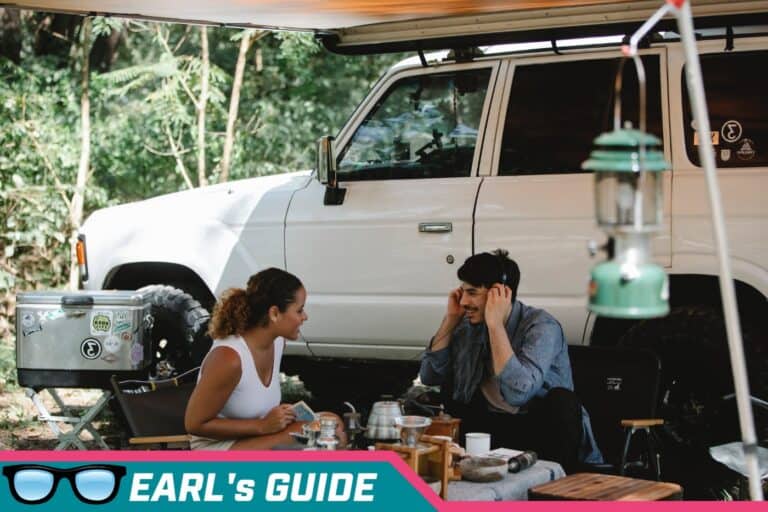Welcome back to our exploration of the camping industry’s most pivotal topics through the lens of the “Campground Catalyst” podcast. I’m Robert Earl, your guide and co-host of the Podcast. In this article, I am delving into the conversations that spark innovation and growth within this vibrant community.
In today’s blog post, we’re unpacking the insights and strategies discussed in episode 2 of our podcast, where we shine a spotlight on maximizing auxiliary revenue streams—a subject of paramount importance to campground owners, investors, and enthusiasts alike.
The camping industry is a dynamic and ever-evolving landscape, where the traditional model of site rentals is just the tip of the iceberg. As we navigate through this episode, we reveal the layered complexity and untapped potential of auxiliary revenue streams. Our discussion not only highlights the critical role these streams play in boosting campground profitability but also underscores their significance in elevating the guest experience to new heights.
Join us as we dissect the strategies that successful campground owners employ to enhance their revenue, the innovative approaches to integrating guest services, and the delicate balance between profitability and satisfaction. This deep dive into episode 2 of the “Campground Catalyst” podcast offers a comprehensive guide filled with actionable insights for those ready to transform their campground into a thriving destination that guests will remember long after their stay.
The Importance of Auxiliary Revenue Streams
The primary income for campgrounds traditionally stems from site rentals. However, as the camping industry evolves, the significance of auxiliary revenue streams cannot be overstressed. These additional income sources not only boost the campground’s profitability but also enhance the overall guest experience, making the campground a destination rather than just a place to stay.
Innovative Strategies for Maximizing Revenue
The podcast guests shared a plethora of innovative strategies that campground owners can implement to increase their revenue. Here are some highlighted approaches:
- Utilizing Natural Resources: Transforming natural resources like small ponds into recreational opportunities such as paddle boarding can create a new income stream while enhancing the guest’s experience.
- Pet-Friendly Amenities: Recognizing the increasing trend of pet travel, amenities like dog parks and dog washing stations can attract a broader audience.
- Food and Beverage Services: Offering simple food options or hosting food trucks provides convenience to guests while generating additional revenue. This strategy doesn’t necessarily require a full-scale restaurant but can significantly impact profitability.
- Community Engagement and Events: Making the campground a community hub through events and activities can draw in locals and visitors alike. Activities ranging from concerts to themed weekends can turn the campground into a destination, encouraging repeat visits and attracting new guests.
- Rental Opportunities: Expanding rental options beyond traditional camping gear to include items like golf carts, bikes, or watercraft can substantially increase revenue. These rentals enhance the camping experience by offering convenience and additional recreational options.
- Merchandising: Selling merchandise such as custom T-shirts, camping essentials, and souvenirs can boost revenue. Positioning these items strategically near activity areas can increase impulse purchases.
- Leveraging Technology: Implementing a modern reservation system can streamline operations and capture additional sales opportunities, such as upselling premium sites or bundled packages.
- Strategic Investment in Amenities: Investing in amenities that indirectly generate revenue, like swimming pools or playgrounds, can make the campground more attractive and justify higher site rates.
The essence of auxiliary revenue streams in the campground industry has increasingly become a pivotal element for owners, investors, and enthusiasts venturing into the outdoor hospitality sector. This transformative approach not only amplifies the profitability of campgrounds but also significantly elevates the guest experience, transforming a mere stay into an unforgettable adventure. Through the insights gleaned from the “Campground Catalyst” podcast, we delve into the myriad of innovative strategies and the profound impact of auxiliary revenue streams on the camping industry.
The Undeniable Importance of Auxiliary Revenue Streams
At the core of campground operations lies the fundamental income derived from site rentals. Yet, as the sector evolves and guest expectations heighten, the incorporation of auxiliary revenue streams presents an invaluable opportunity. These streams not only serve as additional income sources but also play a crucial role in enriching the camping experience, offering guests more than just a place to park their RV or pitch their tent. They transform the campground into a destination teeming with activities, amenities, and services that cater to a wide array of preferences and needs.
Crafting Unique Experiences through Natural Resources
One of the standout strategies for enhancing campground revenue and guest satisfaction is the creative utilization of natural resources. An example shared during the podcast highlights transforming a small pond into a recreational hotspot by introducing paddle boarding. This ingenious use of natural features not only creates an additional revenue stream through rentals but also adds a unique activity that can attract guests looking for more than the traditional camping experience. It underscores the importance of viewing the campground’s natural assets through a lens of opportunity, where every lake, trail, or wooded area holds potential for creating memorable experiences and, consequently, new revenue paths.
Embracing the Pet-Friendly Trend
Recognizing the growing trend of pet travel, implementing pet-friendly amenities such as dog parks and dog washing stations emerges as a lucrative strategy. These amenities not only cater to the needs of pet owners but also position the campground as a welcoming and inclusive destination for the entire family, furry members included. By tapping into the pet-friendly market, campgrounds can attract a broader audience, fostering loyalty among pet owners and generating additional income through pet-specific services and products.
Innovating Food and Beverage Services
Food and beverage services represent another significant avenue for auxiliary revenue. The podcast discussion sheds light on the simplicity and effectiveness of offering food options or hosting food trucks within the campground. This approach not only provides convenience to guests but also creates a vibrant community space where people can gather, share meals, and enjoy local cuisine. Whether through a small onsite café or a rotating selection of food trucks, these services enhance the camping experience while contributing to the campground’s revenue.
Fostering Community Engagement and Hosting Events
Transforming the campground into a community hub through events and activities is a powerful method for drawing in both locals and visitors. From concerts to themed weekends, creating events that turn the campground into a destination fosters a sense of community, encourages repeat visits, and attracts new guests. These activities not only generate direct revenue through ticket sales or participation fees but also indirectly increase spending on accommodations, rentals, and other campground services.
Expanding Rental Opportunities
The expansion of rental opportunities, including gear, golf carts, bikes, or watercraft, is highlighted as a significant revenue booster. Rentals not only provide guests with the convenience and enjoyment of trying new activities but also represent a substantial income stream. The key to success in rentals lies in offering a variety of options that cater to different interests and age groups, ensuring there’s something for everyone.
Leveraging Merchandising for Additional Income
Merchandising, encompassing everything from custom T-shirts and camping essentials to souvenirs, emerges as a fruitful revenue stream. By strategically placing merchandise in areas of high guest traffic or near activity centers, campgrounds can capitalize on impulse purchases, increasing overall sales. This strategy not only boosts revenue but also enhances brand visibility and guest loyalty, as souvenirs serve as tangible memories of the camping experience.
The Strategic Use of Technology in Revenue Maximization
Embracing modern technology, particularly through the implementation of an advanced reservation system, can significantly streamline campground operations and open up new revenue opportunities. Such systems can facilitate upselling premium sites, bundling packages, and simplifying the booking of activities and rentals. The adoption of technology not only improves operational efficiency but also enriches the guest experience by offering convenience and personalization.
Investing in Amenities for Indirect Revenue Growth
Investing in amenities that indirectly contribute to revenue growth, such as swimming pools, playgrounds, or event spaces, can make a campground more appealing and justify higher site rates. These investments, while not directly generating income, significantly enhance the attractiveness of the campground, leading to increased occupancy rates and the ability to command premium pricing.
The strategic development of auxiliary revenue streams is instrumental in transforming campgrounds into vibrant destinations that offer guests an enriched experience. By innovatively leveraging natural resources, embracing pet-friendly trends, offering food and beverage services, engaging the community with events, expanding rental opportunities, utilizing merchandising, adopting
The Role of Investment and Tax Benefits
Investment plays a crucial role in expanding and improving campground facilities, directly impacting the ability to generate auxiliary revenue. Moreover, understanding and leveraging tax benefits such as cost segregation can provide significant financial advantages. These benefits not only reduce tax liabilities but can also free up capital for further investment into revenue-generating projects.
The strategic involvement of investment and the intelligent leverage of tax benefits stand as a cornerstone for catalyzing the growth and enhancement of campground facilities, directly influencing their capability to generate auxiliary revenue streams. This nuanced approach not only paves the way for substantial financial gains but also underscores a campground’s evolution into a destination that offers an enriched guest experience. Delving into the insights from the “Campground Catalyst” podcast, we explore the instrumental role of investment in campground expansion and the pivotal advantages of tax benefits in optimizing campground operations and profitability.
Harnessing Investment for Expansion and Improvement
Investment in campground infrastructure represents a critical strategy for broadening the scope of auxiliary revenue streams. This financial infusion allows for the development of new amenities, the enhancement of existing facilities, and the overall improvement of the campground’s appeal and functionality. From adding new campsites to introducing innovative recreational activities, the strategic deployment of capital investment can significantly elevate the campground experience, attracting a wider audience and encouraging repeat visits. For campground owners and investors, this approach not only enhances the property’s value but also opens up new avenues for revenue generation beyond traditional site rentals.
Navigating the Landscape of Tax Benefits
Understanding and leveraging tax benefits, such as cost segregation, emerges as a significant financial strategy that can provide campground owners with considerable advantages. Cost segregation allows for the acceleration of depreciation on certain campground assets, offering a substantial reduction in tax liabilities. This advanced tax strategy can lead to immediate cash flow improvements, enabling owners to reinvest in their campgrounds, further expanding and improving facilities, and thereby increasing potential income streams. The podcast discussion illuminates how such tax benefits not only serve to alleviate immediate financial burdens but also strategically position campgrounds for long-term growth and success.
Cost Segregation: A Catalyst for Financial Efficiency
Cost segregation stands out as a particularly effective tool in maximizing tax efficiency for campgrounds. By identifying and reclassifying personal property assets to shorten the depreciation time for taxation purposes, campground owners can significantly reduce their taxable income. This process not only yields immediate financial benefits but also aligns with strategic planning for future investments in campground expansion or enhancement. The ability to offset income with accelerated depreciation not only enhances cash flow but also reflects a savvy utilization of the tax code to support business growth and development.
Investment and Tax Strategy: Supporting Sustainable Growth
The integration of strategic investment and the exploitation of tax advantages form a symbiotic relationship that propels the sustainable growth of campgrounds. Investment fuels the development of new amenities and services that enrich the guest experience and open up additional revenue streams. Concurrently, tax benefits such as cost segregation provide the financial flexibility and efficiency needed to support these investments, creating a virtuous cycle of growth and improvement. This strategic approach not only benefits campground owners and investors through increased profitability and asset value but also enhances the camping experience for guests, making the campground a sought-after destination.
The pivotal role of investment in campground expansion and the strategic leverage of tax benefits underscore a comprehensive approach to enhancing campground profitability and guest experience. Through a thoughtful combination of financial investment and tax optimization, campground owners can transform their properties into destinations that offer a wealth of activities, amenities, and services. This not only fosters a memorable experience for guests but also positions the campground for sustained growth and success in the competitive outdoor hospitality industry. The insights from the “Campground Catalyst” podcast illuminate the potential that lies in marrying investment strategies with tax advantages, paving the way for a prosperous future for campground owners and investors alike.
Balancing Additional Revenue and Guest Experience
While exploring various revenue streams, it’s essential to maintain a balance to avoid the perception of nickel-and-diming guests. Offering value-added services and amenities that genuinely enhance the guest experience is key. The focus should always be on creating memorable experiences, with additional revenue streams naturally complementing the primary service offering.
In the realm of campground operations, the delicate balance between generating additional revenue and ensuring guest satisfaction is paramount. The insights from the “Campground Catalyst” podcast shed light on this intricate dance, highlighting the importance of not just seeking new revenue streams but doing so in a manner that enriches the guest experience without feeling burdensome. This third section delves deeper into the ethos of balancing revenue generation with guest experience, underscoring strategies that can help campground owners navigate this challenge successfully.
Enhancing Guest Experience through Thoughtful Revenue Streams
The key to successful auxiliary revenue streams lies in their integration into the overall guest experience. Rather than viewing these streams as mere financial transactions, campground owners are encouraged to see them as opportunities to enhance the camping experience. For instance, offering rental options like bikes, paddleboards, or kayaks provides guests with the convenience of exploring the campground and its surroundings without the hassle of bringing their own equipment. This not only generates additional income for the campground but also adds value to the guest’s stay, making it more enjoyable and memorable.
Strategic Pricing and Value Perception
A critical aspect of introducing new revenue streams is the pricing strategy. It’s essential to strike a balance between profitability and value perception among guests. Overpricing services or amenities can lead to negative perceptions and deter guests from utilizing them, while underpricing might not cover the costs or deliver the expected profitability. Engaging in market research, understanding guest demographics, and carefully considering the added value of each service or amenity can guide campground owners in setting prices that are both profitable and perceived as fair by guests.
Transparent Communication and Upselling
Transparency in communication about the costs associated with additional services and amenities plays a crucial role in maintaining guest satisfaction. Clear, upfront communication about what’s included in the base price of a stay and what constitutes an extra charge helps set the right expectations and fosters trust between the campground and its guests. Furthermore, training staff in the art of upselling—not as a pushy sales tactic but as a way to enhance the guest’s experience—can significantly increase revenue while ensuring guests feel they’re receiving value for their money.
Investing in Indirect Revenue Generators
Investing in amenities and services that may not directly generate revenue but contribute to an enhanced guest experience is another strategy for balancing revenue and satisfaction. For instance, creating well-maintained communal spaces, playgrounds, or adding free Wi-Fi access can make a campground more appealing to potential guests. These indirect revenue generators can lead to higher occupancy rates and the ability to command higher prices for campsites, ultimately contributing to the campground’s profitability.
Feedback Loops and Continuous Improvement
Establishing mechanisms for guest feedback is crucial in fine-tuning the balance between revenue generation and guest satisfaction. Feedback loops, whether through post-stay surveys, online reviews, or direct conversations during the stay, provide invaluable insights into guest preferences, perceived value, and areas for improvement. This continuous feedback loop enables campground owners to make informed decisions about which auxiliary revenue streams to develop further and which to adjust or eliminate, ensuring that the guest experience remains at the forefront of operational decisions.
Balancing the pursuit of auxiliary revenue streams with the imperative of maintaining and enhancing guest satisfaction is a nuanced challenge for campground owners. By integrating additional revenue opportunities into the guest experience, employing strategic pricing, communicating transparently, investing in indirect revenue generators, and establishing feedback loops for continuous improvement, campground owners can navigate this challenge successfully. The insights from the “Campground Catalyst” podcast underscore the potential for campgrounds to not only increase their profitability but also become cherished destinations that guests return to year after year.
A Destination, Not Just a Campground
Transforming a campground into a destination requires a strategic approach to developing auxiliary revenue streams. By focusing on guest experience, community engagement, and leveraging the natural and developed assets of a campground, owners can significantly enhance profitability. The insights from the “Campground Catalyst” podcast serve as a valuable guide for anyone in the camping industry looking to maximize their investment and create a thriving campground that guests will return to year after year.
The pursuit of transforming a campground into a destination encompasses more than just providing a place for guests to stay; it involves creating a comprehensive experience that entices visitors from near and far. Drawing on the insights from the “Campground Catalyst” podcast, the fourth section emphasizes the significance of making a campground a community hub and a destination in its own right. This approach not only fosters a sense of belonging and enjoyment among guests but also plays a crucial role in maximizing revenue through auxiliary streams.
Creating a Community Hub through Events and Activities
One of the most effective strategies for turning a campground into a destination is to host events and activities that appeal to a broad audience. From themed weekends and holiday celebrations to concerts and outdoor movie nights, these events serve as major attractions that can draw visitors not just from the immediate vicinity but also from further afield. By creating a calendar filled with diverse and appealing events, campgrounds can ensure a steady flow of guests, encouraging both first-time visits and repeat stays. Importantly, these events provide an excellent opportunity for campgrounds to generate additional revenue through ticket sales, activity fees, and increased occupancy rates.
Leveraging Local Partnerships
Partnering with local businesses and attractions can further enhance a campground’s appeal as a destination. Collaborations with local food trucks, craft breweries, adventure sports providers, and cultural institutions can offer guests unique experiences that they might not find elsewhere. These partnerships not only enrich the campground’s offerings but also support the local economy, creating a symbiotic relationship between the campground and its community. Moreover, such collaborations can lead to cross-promotional opportunities, increasing visibility and attracting a wider audience.
Investing in Unique Amenities
Investing in unique amenities that set a campground apart from others is another critical aspect of becoming a destination. Whether it’s a state-of-the-art playground, a well-equipped outdoor kitchen, a luxurious spa, or a water park, unique amenities can significantly enhance the attractiveness of a campground. These investments, while requiring upfront capital, can pay dividends in the long run by increasing the campground’s competitive edge, allowing for premium pricing, and encouraging longer stays.
Engaging with the Digital Community
In today’s digital age, creating a strong online presence is indispensable for campgrounds aiming to become destinations. Engaging with potential and past guests through social media, maintaining a user-friendly website with rich content about the campground and its events, and leveraging online booking platforms can significantly widen a campground’s reach. Sharing captivating stories, testimonials, and behind-the-scenes glimpses of campground life can foster a sense of community and belonging, even before guests arrive on-site.
Cultivating an Inclusive Environment
Finally, ensuring that the campground caters to a diverse range of guests is crucial in making it a welcoming destination for all. This includes offering accommodations and amenities that are accessible to guests with disabilities, providing options that cater to various age groups and interests, and creating a safe and inclusive environment for everyone. By embracing diversity and inclusivity, campgrounds can appeal to a broader audience, enhancing their reputation and attractiveness as a destination.
Transforming a campground into a destination is a multifaceted endeavor that requires creativity, investment, and a deep understanding of guests’ desires and expectations. By creating a vibrant community hub, investing in unique amenities, leveraging local partnerships, engaging with the digital community, and cultivating an inclusive environment, campground owners can significantly enhance their property’s appeal. These efforts not only contribute to a richer guest experience but also pave the way for increased occupancy, higher revenue streams, and the establishment of the campground as a must-visit destination in the competitive world of outdoor hospitality.
The “Campground Catalyst” podcast delves into the crucial aspect of maximizing auxiliary revenue streams for campground owners, investors, and enthusiasts. It emphasizes the importance of not just relying on traditional income from site rentals but exploring innovative strategies to enhance profitability and guest experience. Key strategies include leveraging natural resources, embracing pet-friendly amenities, offering food and beverage services, engaging the community with events, and investing in unique amenities. The discussion also highlights the significance of strategic investment and tax benefits, like cost segregation, to support campground expansion and improvement. Furthermore, it stresses the balance between generating revenue and ensuring guest satisfaction, advocating for transparent communication, strategic pricing, and the integration of additional revenue opportunities into the guest experience. The podcast ultimately outlines how campgrounds can transform into destinations by becoming community hubs, investing in amenities, and creating inclusive environments that cater to a diverse range of guests.
FAQ
1. What are some effective ways to maximize auxiliary revenue streams in a campground?
- Effective ways include offering rental options like bikes or paddleboards, introducing pet-friendly amenities, providing food and beverage options, hosting community events, and investing in unique amenities to enhance the guest experience.
2. How can campgrounds leverage tax benefits for growth?
- Campgrounds can leverage tax benefits such as cost segregation to accelerate depreciation on certain assets, reducing taxable income and freeing up capital for further investment in campground expansion or enhancements.
3. How do campgrounds balance generating additional revenue with maintaining guest satisfaction?
- Balancing additional revenue with guest satisfaction involves integrating revenue opportunities that enhance the camping experience, employing strategic pricing, transparent communication about costs, and investing in amenities that indirectly contribute to profitability while improving guest experience.
4. Can you give examples of unique amenities that could make a campground a destination?
- Unique amenities that can transform a campground into a destination include state-of-the-art playgrounds, luxurious spas, water parks, outdoor kitchens, and engaging with local attractions through partnerships to offer exclusive guest experiences.
5. Why is engaging with the digital community important for campgrounds aiming to become destinations?
- Engaging with the digital community through social media, maintaining a user-friendly website, and leveraging online booking platforms is crucial for campgrounds aiming to become destinations as it widens their reach, fosters a sense of community, and enhances visibility to attract a wider audience.
In embracing these strategies, campground owners can navigate the challenges of the industry while ensuring their operations are sustainable, profitable, and, most importantly, memorable for their guests. The journey from a traditional campground to a vibrant destination is paved with innovation, investment, and a deep understanding of what today’s campers seek in their outdoor experiences.

Robert Earl
Robert EarlRobert has 20+ years of experience as a Real Estate Agent, Coach, Digital Marketer & Author, coupled with a unique expertise in professional RV Park Management. His time as an RV Park Manager has been marked by a strong ability to increase campground occupancy and revenue through strategic management and targeted marketing efforts. His dual career in online marketing and RV Park Management provides a rich perspective on success in diverse fields. Robert Earl is passionate about teaching and empowering others to pursue their dreams and create sustainable income. Whether through a career in real estate, affiliate marketing, niche blogging, or transforming campgrounds into thriving communities, his proven strategies and techniques have helped numerous individuals and businesses succeed. Based on his years of experience and knowledge in the online marketing industry, along with his hands-on management in the RV Park sector, he has crafted a unique and effective approach to personal and professional growth. In addition to his business pursuits, Robert is also a CrossFit Online Level 1 Trainer (CF-OL1) and enjoys fitness activities, including Rucking workouts while traveling the country. His multifaceted career showcases his dedication to growth, innovation, and the pursuit of excellence in various domains.






